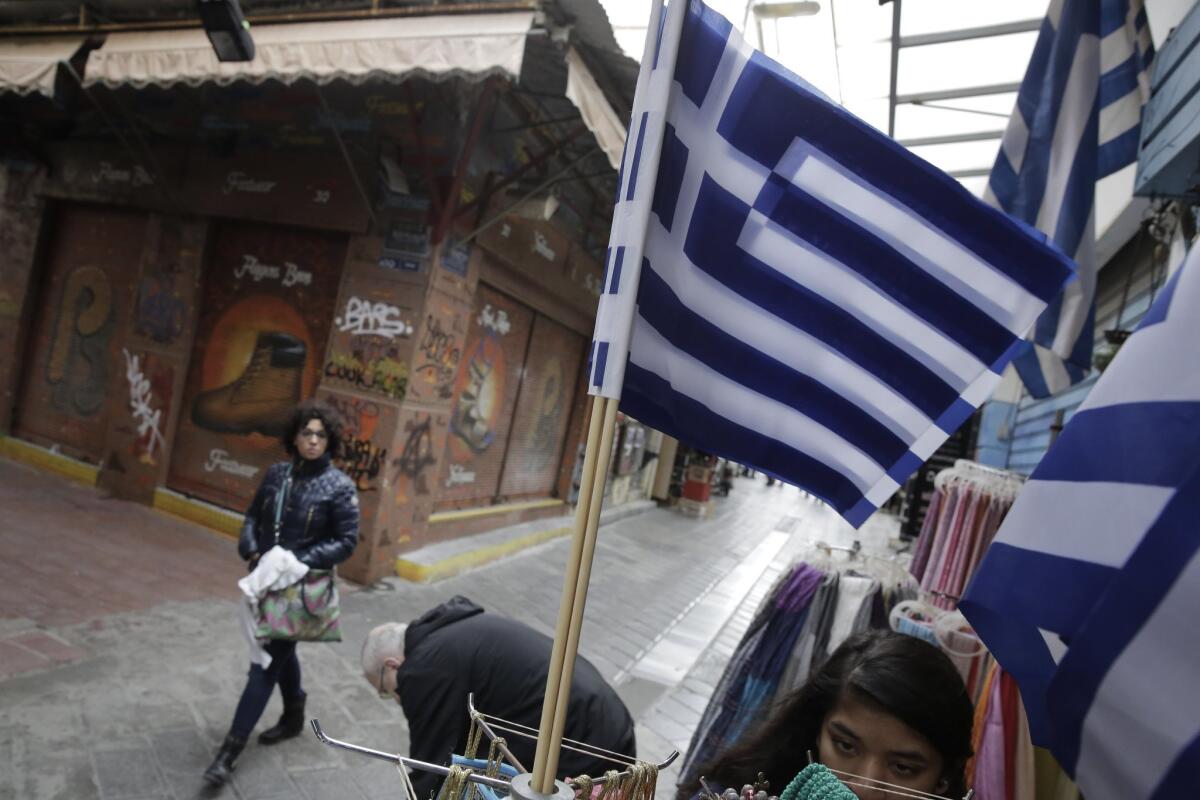Greek reforms draw skepticism after Europe finance chiefs’ short meeting

- Share via
Reporting from Athens — What had been expected to be another long and drawn-out meeting about Greece’s lingering financial woes broke up after about 15 minutes Monday without European financial ministers taking formal action on proposed reforms to the nation’s crippled economy.
Technical committees representing Greece and its international lenders were ordered to hold talks beginning Wednesday to verify the country’s economic and fiscal situation in light of the reform efforts. That decision was seen as a clear reminder that Athens, run by a newly elected leftist government, still remained under the control of its creditors.
The lack of progress on the reforms drew sharp words from the head of the Eurogroup, composed of financial ministers from nations sharing the euro currency.
“We have lost over two weeks in which very little progress has been made,” said Jeroen Dijsselbloem, the Dutchman who heads the group. “Real talks have not started yet; there has been no implementation so we have to stop wasting time.”
Monday’s meeting was the first since the finance ministers last month granted a four-month extension of the rescue plan offered to Greece in exchange for Athens taking rigorous reforms to jump-start its economy, stuck deep in the doldrums of a six-year recession.
The meeting was due to review a menu of such reforms relayed to the group by Greek Finance Minister Yanis Varoufakis. Among the proposals leaked to the news media were plans to wire homemakers, students and tourists with hidden cameras and tracking devices to spy on tax dodgers, a plan that drew global headlines and scorn from government opponents.
“Another batch will follow next week, and more after that,” Varoufakis said. “Every move will be made with the notice and consent of creditors so as not to derail finances.”
No joint communique was issued after Monday’s brief gathering, which a spokesman for Greece’s new left-leaning administration termed “a positive meeting.”
“We’re moving forward,” the spokesman, Gabriel Sakellarides, told the Skai television network.
Other Eurozone officials remained skeptical. “Greece still has a lot of homework to do,” Belgian Finance Minister Johan Van Overtveldt said.
Sakellarides insisted that his nation’s proposals were “quickly endorsed” but would be further revised during technical talks. He also denied reports of a heated run-in between Varoufakis and German Finance Minister Wolfgang Schaeuble, whose country is the largest single contributor to Greece’s $260-billion international bailout.
Failure to reach agreement on Greece’s grab bag of reforms could delivered a serious blow to Athens and sink it deeper into financial turmoil.
Loan repayments and state expenses totaling $7.42 billion are due this month — money Athens does not have, forcing the government to tap into state pension and social security funds to meet deadlines. The cash crunch has also given rise to the prospect of a third bailout, topping an already mammoth lifeline that the European Union and the International Monetary Fund cast Greece five years ago when its economy skid off the fiscal cliff.
The running dispute over Greece’s lingering fiscal woes highlights just how difficult it is for the newly elected leftist government to implement what many market analysts are calling an “impossible agenda of promises.” It also points to newfound friction between Varoufakis and the country’s creditors — and even between the financial minister and fellow members of Greece’s ruling Syriza party — because of controversial remarks and negotiating tactics.
“The government was elected on the promise to deliver on two themes: to keep the country anchored within the single European currency and splurge 12 billion euros [about $13 billion] on a stimulus package to ease crisis-crippled Greeks,” said Miranda Xafa, a leading economist and former International Monetary Fund board member. “The problem is that the two themes are completely incompatible.”
As reality sinks in, radical leftist Prime Minister Alexis Tsipras and his government “may have no other choice than to state the obvious to its voters and ask them to choose,” Xafa said.
Over the weekend, Varoufakis said the government could hold a plebiscite or resort to early elections if negotiations deadlocked Monday. His remarks and proposals, including the plan to root out tax cheats, prompted calls for his resignation by rival conservatives.
“Greece has become desperately isolated; his proposals range between being unclear to ridiculous,” said Kyriakos Mitsotakis, party whip for the conservative New Democracy party. “With what Mr. Varoufakis is doing, he is dangerous for the country and the best thing the government can do is to replace him.”
The prime minister refused to comment, but his aides pointed to polls showing more than 60% of respondents supporting the government and its negotiating strategy since winning elections in January.
Carassava is a special correspondent.
More to Read
Sign up for Essential California
The most important California stories and recommendations in your inbox every morning.
You may occasionally receive promotional content from the Los Angeles Times.









